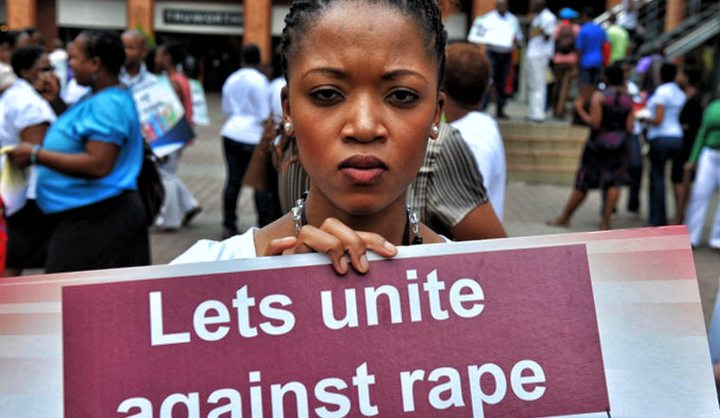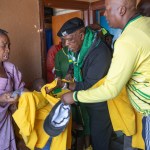Maverick Life, South Africa
Health-E News: Rape example in text book shows systemic flaws

For five years, no teacher raised a problem with a text book that blames a girl for her rape. HEALTH-E’s GILL GIFFORD reports.
For the past five years, teenagers at South Africa’s government high schools have been taught in Life Orientation classes that it is the victim’s responsibility to prevent rape.
This means that over three million young minds have been taught that the rapist should be excused or left out of the picture, while the actions of their victims should be questioned and scrutinised.
This alarming discovery came to light last week after an upset mother posted a photograph of page 179 of her Grade 10 daughter’s Focus Life Orientation textbook on Facebook. Yonela Moopelwa wrote: “This activity is teaching our kids to justify rape! How can this be allowed, in a country that already has horrifying rape statistics?”
Her outrage was over a scenario involving a teenage girl who was raped at a house party. ‘Angie’ had lied to her parents in order to go with her friends to a bash she would ordinarily not have been allowed to go to. At the party, Angie had a few drinks and then her friends pushed her into a room with an unknown guy, and locked the door. She banged on the door, but her friends laughed and didn’t open up. The man raped her.
After the event Angie was afraid to tell her parents what had happened, and therefore felt she could not report the rape. She was afraid of having contracted HIV, a sexually transmitted infection or of becoming pregnant. Pupils were asked three questions about the scenario, the first one being “List two ways Angie’s behaviour led to sexual intercourse”. This question drew much wrath on social media.
The suggested answer to question one, according to the teachers’ guide, is that the two ways Angie’s behaviour that ‘led to sexual intercourse’ were that she lied to her parents and that she drank too much alcohol.
If the genders had been switched and the scenario involved a male teenager attending a party, getting drunk and then being locked in a room by friends while a woman beat him to a pulp, it is hard to imagine that the first question would have been: “List two ways that Johnny’s behaviour led to his being assaulted”.
The Department of Basic Education was quick to respond to Moopelwa’s distressed call for action, announcing that the ‘inappropriate content’ would be withdrawn.
“The Department of Basic Education has noted concerns and complaints emanating from a page in one of the Grade 10 textbooks. The content referred to is both unintended and unfortunate,” said spokesman Elijah Mhlanga.
Speaking about the ‘problematic’ question, Mhlanga explained: “This question raises very serious misconceptions and stereotypes about rape and the relationship between the perpetrator and the victim, in that the victim might have played a role that led her to be raped.
“The department is fully aware of implications such scenarios have on the psyche of our children and the general public about the scourge of rape that the country is battling with. Furthermore, the question refers to the incident as ‘intercourse’ which may further confuse learners. The importance of mediation by teachers in this instance becomes important as should be the case in a classroom environment.”
He said the department further acknowledged the fact that the content perpetrated impunity and victim blaming: “The textbook in question, published and distributed in 2011, forms part of content that Minister Angie Motshekga has asked to be tested for inappropriate or contradictory content,” Mhlanga said.
Motshekga has moved swiftly and appointed a task team to further evaluate textbooks to ensure they are free of bias in terms of race, sex, gender and other forms of discrimination. The team is made up of experts from Higher Education Institutes (HEIs) and will look at a broad sample of textbooks – specifically promoting content that fosters diversity.
Their recommendations, Mhlanga said, would be passed on to the minister at a later stage. The department has also been in contact with the publisher – Pearson – who have stated that “there will be no further reproductions of this edition” and according to communications manager Ursula Ndhlovu, new content would be shared via their website.
But is this enough to undo the damage that has already been done? What can be said about the fact that, for five years, teachers have raised no concerns about the material they have been teaching, and that it took an angry mother to raise the issue?
“We mark 16 days of Activism for No Violence Against Women and Children, we celebrate Women’s Month, and then at the same time we have this,” said Lisa Vetten, a research associate for the Wits Institute for Social and Economic Research.
“The questions are retrogressive and the answers are purely victim blaming. There is no questioning of the responsibility of the others involved, nothing to interrogate their facilitating or preventing rape. In this scenario, the friends are most certainly morally, if not criminally liable for helping a rapist.”
No attention, she said, was given to the fact that a rapist who was HIV positive at the time of an attack and did not use a condom, could be charged with attempted murder and be sentenced to life in prison.
“There is a complete failure to look at how society facilitates and enables rape by constantly keeping the focus on the victim. The group at greatest risk of rape is young woman – which is exactly what this scenario is about,” Vetten said.
She believes that a review of textbook material falls short of what is needed to properly address the situation.
“Quite frankly, the training of teachers is inadequate. We need to look at what prejudices they bring to the table as they teach material without any kind of critical approach. They themselves are a product of society, so they peddle the common narrative,” Vetten said.
Much work needs to be done to change South Africa’s rape culture. It seems it remains up to mothers to teach our daughters healthy scripts for relationships and have them hold others accountable for their actions rather than blaming themselves. And we need to teach our sons that sexual harassment of any kind is unacceptable, that no means no and that rape is wrong. DM
Photo: GCIS’s Day of Action Against Rape, 11 Feb 2013 (GCIS)


















